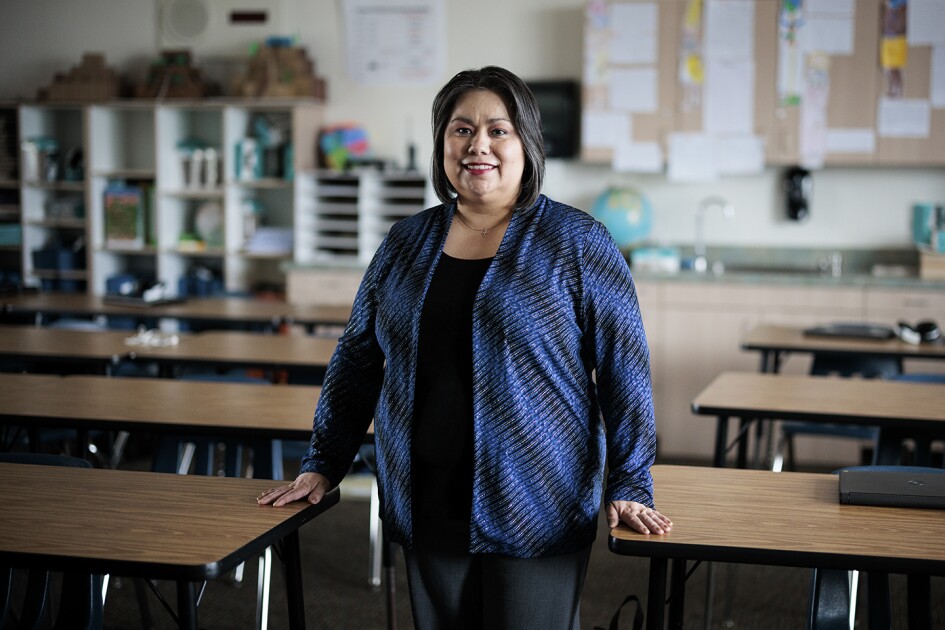A coalition of school, civil rights, and child-advocacy groups handed a list of 14 recommendations for changing the federal No Child Left Behind Act to congressional staff members at the U.S. Capitol last week, just a day after President Bush vigorously defended the law on its fourth anniversary.
Consequences of the law demand these “critical changes,” Reggie Felton, the director of federal relations at the National School Boards Association, said on Jan. 10 to more than 30 congressional staff members.
The No Child Left Behind law, a reauthorization of the Elementary and Secondary Education Act, was signed by President Bush on Jan. 8, 2002, and is scheduled for reauthorization in 2007.
“We would also encourage you to use local school districts and local communities as a base to get a sense of ‘will this work’ or ‘will this not work,’ ” Mr. Felton added.
A day earlier, Mr. Bush traveled to North Glen Elementary School in Glen Burnie, Md., to call attention to the law’s success stories. The law calls for students to be tested in grades 3-8 and once in high school to meet annual educational goals, or their schools and districts could face sanctions.
‘It’s Working’
“I’m here today to talk about the spirit of the No Child Left Behind Act, the evidence that says it’s working, and my deep desire to work with Congress to make sure it continues to have the desired effect on children all across the country,” Mr. Bush told the crowd at North Glen Elementary on Jan. 9.
The coalition aiming to alter the law hopes to influence Congress, although eliminating the law outright is not among its recommendations.
“It’s not a question of saying ‘No’ [to NCLB],” said one of the coalition’s leaders, Monty Neill, the executive director of FairTest, a Cambridge, Mass.-based group that is formally known as the National Center for Fair & Open Testing. The group is critical of the law’s use of standardized tests as its fundamental measure of progress.
The joint effort is called the Forum on Educational Accountability, and 67 groups have signed on to its agenda, including the National Education Association and the National Association for the Advancement of Colored People.
Mr. Neill said the groups want to reverse NLCB-era trends toward “narrowing the curriculum, [and] school systems pushing out students from schools in order to boost test scores.”
But President Bush stressed last week that the states design and administer their own tests to ensure that decisions are made on a state and local level.
“An important part of the No Child Left Behind Act is the understanding that one size does not fit all when it comes to public schools, and that the governance ought to be local,” he said. “If you’ve noticed, I’ve never said the federal government is going to tell you how to teach. That would be the worst thing that could happen to the public school system.”
Unrealistic Goal?
However, Mr. Neill also sought to highlight what he believes is the law’s unrealistic goal of having all students be “proficient” in key subjects by the 2013-14 school year.
“Quite frankly, 100 percent proficiency by 2014 isn’t happening, and everyone knows it isn’t happening,” he said.
The forum’s recommendations include placing less reliance on state tests, adding flexibility to the amount and scheduling of testing, and greatly increasing federal funding to cover the costs of meeting the law’s requirements.
These ideas are “an initial cut,” with more details to come, Mr. Neill said. “You’ll note there’s some vagueness in this language. To some extent, that is papering over issues that we haven’t had to time to work through.”
But the 14 recommendations have been around at least since October 2004, when they were released as a “joint organizational statement” with 31 signatories, including FairTest, the NSBA, the NEA, and the NAACP, all of which remain on board.
Nicole Francis-Williams, the interim director of education at the NAACP, suggested that the forum could help spotlight the consequences of the education law for civil rights.
“It’s difficult—impossible—to take a cookie-cutter approach to assessing a diverse population,” she said.
The Achievement Gap
President Bush argued last week that the law was benefiting minority students. He cited last year’s scores from the federally sponsored National Assessment of Educational Progress, which helps to chart students’ progress.
He cited last summer’s NAEP data which, according to Mr. Bush, showed that 4th graders “set records,” for example, in reading and mathematics in 2005. Those same test results also showed gains in reading and math for Hispanic 4th graders, as well as for 8th grade Hispanic and African-American students, Mr. Bush said.
“One of our goals has got to be to … close that achievement gap,” Mr. Bush said. “And we’re doing it.”
Some prominent education groups are not participating in the Forum on Educational Accountability, such as the American Federation of Teachers, the National PTA, and the Council of the Great City Schools.
Alexander Wohl, a spokesman for the 1.3 million-member AFT, said the teachers’ union shared many concerns with the coalition members, but so far has decided not to join them. In part that’s because the AFT has its own campaign to improve the law, he said.
“We agree,” he said, “with the efforts of this group and the principles of this group.”







